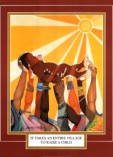
Teaching Guidelines For PreK-12
Benefits of Volunteering that Will Inspire You to Take Action:
https://growensemble.com/why-volunteer/
Being prepared for life is developed through experiences, pursuits, desires and determination. The greatest act of love is Jesus. It is through love we teach our children. We absolutely love our children. As you prepare for the eventuality of your child leaving please share with them the opportunites of a strong emotionally intelligent & spiritually fulfuilling life.
Seeing 31yrs of graduating seniors, the evidence shows how competitions, teams, extracurricular activities, chores, volunteering and sports make the difference in the hearts our childern on a larger scale than academia can do alone. As with anything worthwhile it takes time and effort to understand the reward. Below are a few examples of how students sought ways to experience getting involved. Please take every opportunity to help your children connect with anything that intrests them and look for ways to turn it into life. Please send any additional activities you might have had the privilege to be involved with to rosewood.bidwell@gmail.com Subject: Extracurricular Activities and we will add them to the list.
|
Southeastern Conference Of Robotics Education (S.C.O.R.E.) VEX IQ training (Locally and Statewide) Duke TIPS in 7th grade Lads to Leaders State - Achievement award for STEM 4-H County - Awards for Graphic Design, STEM Freestyle Showcase, and STEM Freestyle Demonstration Alabama Governors App Challenge - Finalist STEM Outreach - 4-H Team 2nd place in the Robotics competition in 20** and 20** STEM Outreach - 4-H Rocketry Team won a Technical Engineering Notebook Award STEM Outreach - 4-H Rocketry TeamQualified for Nationals STEM Initiative - Recognition for 4-H Robotics 2nd place in 20** BEST Robotics - His team qualified for the Southern Regional Championship twice BEST Robotics - Technical Engineering Notebook Award, Robot Construction Award Homeschool Robotics - A Project Showcase at the local regional fair Lockheed-Martin CodeQuest Programming Competition - 1st place team Duke TIPS - High ACT Recognition at the state level in 7th grade Lads to Leaders - Bible Bowl Test High Scorer Award Alabama Home Educators - 20** Outstanding Alabama Homeschooler Heritage School Civitan Club: 9th 20hrs 4-H Club Lauderdale County: 7th-12th Leadership,Photograph,Outreach Junior Cattleman: 7th-12th 254hrs Vice Pres. President Cattleman’s Association: 11th-12th 50hrs Lads to Leaders to Leaderettes Good Samaritans: 7th-12th 330hrs Teach to Teach Gold Medal: 9th Language Award Leaderettes Gold Medal: 9th 4-H x2/1st Place Photography: 7th County Round Up 1st Place: 8th County Round Up 1st Place Photography: 8th Regional Congress Photography x3/1st Place: 9th Regional Congress Photography 2nd Place: 9th North Alabama State Fair 1st, x2/2nd,3rd Place Photography: 7th Photography 9th-10th Martial Arts 9th-12th 70+ (Church,Karate and Library)
|
TARC (The American Rocket Contest) - His team qualified to participate in nationals, and for the fly-offs at nationals STEM Outreach - 4-H Team 2nd place in the Robotics competition in 20** and 20** STEM Outreach - 4-H Rocketry Team won a Technical Engineering Notebook Award STEM Initiative - Recognition for 4-H Robotics 2nd place in 20** BEST (Boosting Engineering Science and Technology) Robotics - His team qualified for the Southern Regional Championship BEST Robotics - Technical Engineering Notebook Award, Robot Construction Award Homeschool Robotics - A Project Showcase at the local regional fair Lockheed-Martin CodeQuest Programming Competition - 1st place team Lads to Leaders - Bible Bowl Test High Scorer Award Alabama Home Educators - 20** Outstanding Alabama Homeschooler Participated in Southern Regional Teen Leadership Conference 1 year County Leadership Conference 1 year Alabama Midwinter 4-H Teen Leaders Retreat 2 years National CS Pathway 4-H Partnership in 20** National 4-H STEM Summit in 20** 4-H County Senior Council 3 years 4-H Advisory Committee STEM Representative 2 Times BEST Robotics Team 5 Seasons 4-H Rocketry Team 5 years 4-H Advanced Robotics Team 3 years CodeQuest 1 year |
Member of 4H 9th thru 11th Grade 1st Place Blocks Rock Competition 9th,10th,11th,12th Grade - Regional Merits Awarded Archery 4H 9th,10th,11th, 12th Grade Member Beta Club 10th Grade State Homeschool Bowling league 9th, 10th, 11th Grade Senior Center- 25hrs, Public Library-104hrs, Huntsville Food Bank-104hrs Animal Search/Rescue Training-24hrs Volunteered at the local VEX Robotics competition for three years Lead clubs such as 4-H robotics, 4-H Gigakids, and rocketry Planned and ran events at 4-H STEM camps (locally and statewide) Taught programming at regional and state-wide training for 4-H volunteers Helped to plan and run regional STEM Expos Lead STEM activities at 4-H Regional Congress Ran an event at 4-H day at the Space and Rocket Center on multiple occasions Lead 4-H STEM demonstrations at the local regional fair Taught programming classes at a local elementary school Taught robotics at the public library summer youth program Lead STEM as a 4-H STEM League Member Volunteered as a Alabama 4-H Tech Changemaker 4-H Horse Club Junior Cattlemen's Club Yearbook Admin/Editor 9th-12rh 1st Place Walk Trot / Alabama 4-H Equine Stat Competition 1st Place Writing / Alabama 4-H Equine State Competition4-H State - Achievement award for STEM 4-H County - Awards for Graphic Design, STEM Freestyle Showcase, and STEM Freestyle Demonstration |
Typical Course of Study Curriculum Guide for Preschool
|
Size *Understands big and little.
|
Colors and Shapes * Recognizes and names primary colors. |
|
Numbers * Counts orally through 10. |
Time * Understands day and night. |
|
Reading Readiness * Remembers objects from a given picture.
|
Motor Skills * Is able to run. |
|
Position and Direction * Understands up and down. |
Listening and Sequencing * Follows simple directions. |
|
Social-Emotional Development * Can be away from parents or primary care givers for 2-3 hours without being
upset. |
Typical Course of Study Curriculum Guide for Kindergarten
Social Studies:
* Meanings of holidays, traditions, and customs
* Understanding and appreciating other cultures
* Individual's role in family, home, school, and community
* Relationship of the individual to the group
* Work and jobs
* Safety rules and symbols
* Basic human needs
* Self-respect and self-awareness
* Awareness of others
* Location of home and school
* Diagram of home and school
Language Arts
* Phonics
* Choral reading
* Listening to literature, music, poetry
* Nursery rhymes, fairy tales, fables
* Social listening
* Constructing visual images while listening
* Oral communication skills
* Role play
* Following and giving directions
* Paraphrasing and summarizing
* Organizing ideas
* Experience stories
* Relating events and experiences usingcomplete sentences
* Listening for correct speech habits and word usage
* Beginning writing process
* Manuscript handwriting
Health and Safety
* Personal hygiene
* Good eating habits
* Good grooming
* Care of teeth
* Major body parts
* Physical fitness
* Safety to and from school
Science
* Observation of everyday, familiar things
* Common animals and plants
* Interrelationships of animals and plants
* Classification of living things
* Farm animals
* Care of pets
* Like and unlike plants
* Indoor plants
* The sun: our principal source of energy
* Weather and seasons
* Temperature
* Light
* Colors
* Senses
* Earth, moon, stars, planets
* Simple measurement
* Beginning experimentation
Mathematics
* Simple counting to 20
* One-to-one relationship
* Concepts of more, less than, same
* Sequence of events
* Correspondence of quantities
* Ordinal-cardinal relationship
* Number-numeral relationship
* Recognition of basic sets
* Meaning of addition and subtraction
* Introduction to number line
* Estimation
* Elementary geometry (shapes)
* Calendar and clock
* Denominations of money
* Basic problem-solving strategies
* Basic chart and graph concepts
Typical Course of Study Curriculum Guide for 1st Grade
|
Social Studies * Holidays, traditions, and customs
Science * Grouping and classification
Health and Safety * Personal hygiene
|
Language Arts * Reading
Mathematics * Counting and writing to 100 |
Typical Course of Study Curriculum Guide for Grade 2
|
Social Studies * Holidays and festivals
Health and Safety * Personal cleanliness
Language Arts * Reading silently for purpose |
Science* Useful and harmful animals
Mathematics * Counting, reading, writing to 1,000 |
Typical Course of Study Curriculum Guide for Grade 3
|
Social Studies * Holidays and folk customs
Science * Animal helpers
Health and Safety * Care of eyes and ears |
Language Arts * Silent reading
Mathematics * Reading and writing numbers to 5 places
|
Typical Course of Study Curriculum Guide for Grade 4
|
Science * Structure of plants
|
Language Arts * Silent and oral reading
|
|
Social Studies * Types of community life
|
Health and Safety * Personal and mental hygiene |
|
Mathematics * Reading and writing numbers |
Typical Course of Study Curriculum Guide for Grade 5
|
Social Studies * Exploration and discovery
Science * Biological adaptations
Health and Safety * Dental hygiene
|
Language Arts * Silent and oral reading
Mathematics * Reading and writing numbers to 10 places * Decimals to the thousandths
|
Typical Course of Study Curriculum Guide for Grade 6
<< New text box >>
|
Social Studies * Global and regional studies
Science * Classification of living things
Health and Safety * Personal appearance |
Language Arts * Reading silently and skimming
Mathematics * Exponents
|
Typical Course of Study Curriculum Guide for Grade 7
|
Social Studies * Lands and peoples of the Eastern Hemisphere
Science * Scientific classification
Language Arts * Improving reading skills |
Health and Safety * Good grooming and posture
Mathematics * Prime and composite numbers
|
Typical Course of Study Curriculum Guide for Grade 8
|
Social Studies * Our African, Asian, and European backgrounds
Science * Scientific method
Health and Safety * Grooming |
Language Arts * Independent reading
Mathematics * Maintaining skills in fundamental operations |
Typical Course of Study Curriculum Guide for Grade 9
|
Social Studies * Basic human communities Mathematics
General mathematics * Ratio and proportion
Algebra 1 * Absolute value |
Science * Earth's history
Language Arts * Evaluating material for accuracy |
Typical Course of Study Curriculum Guide for Grade 10
|
Social Studies * Prehistoric peoples
Science * Characteristics of life |
Language Arts * American literary heritage
Mathematics * Origins and uses of geometry |
Typical Course of Study Curriculum Guide for Grade 11
|
Social Studies * Age of exploration and discovery
MathematicsAlgebra II * Relations and functions Trigonometry * Solutions of right triangles |
Science* Matter and its behavior
Language Arts* American literature
|
Typical Course of Study Curriculum Guide for Grade 12
|
Social Studies * Principles of U. S. government
Science * Physics
Language Arts * English literature |
Mathematics Calculus * Derivative of a function Advanced Algebra * Sets of numbers
Probability and Statistics * Tabular data |
Rosewood Academy & High School
Providing a church school cover for families homeschooling in Alabama
updated 06/2023


